|
Source
:
Joel S. A. Hayward, STOPPED AT
STALINGRAD:
THE LUFTWAFFE AND HITLER'S DEFEAT IN
THE EAST 1942-1943.
Lawrence, KS: University Press of
Kansas, 1998.
Second ed 2001. ISBN: 0-7006-1146-0.
http://www.joelhayward.org
General
Zeitzler, Chief of Staff of the Army, struggles with Hitler for
the salvation of the
Stalingrad army.
The dramatic discussions took
place during the nights of 22/23 and 23/24 November 1942
at Fuehrer Headquarters, the Wolfschanze, near Rastenburg.
Zeitzler reported on this in an
article that contains his memoirs of the battle of Stalingrad
and was published in book form in
English in 1956 under the title The Fatal Decisions.
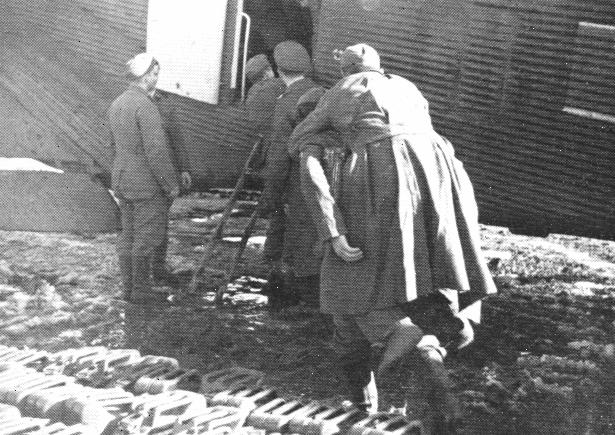
'Since the operations proposed
for the relief of Sixth Army cannot be successful, it is
decisive that orders for a break-out be issued. This must be
done at once. The last possible
moment has arrived.'
While I was speaking, Hitler was
visibly growing more and more angry. He had repeatedly
tried to interrupt me but I had not permitted this because I
knew this to be my last chance
and I could not stay silent. When I was finally finished, he
screamed, 'Sixth Army will stay
where it is! It is the garrison of a fortress and it is the duty
of garrisons to withstand sieges.
If necessary they will hold out all winter and I will relieve
them by an offensive in the spring.'
This was pure fantasy. I added,
'Stalingrad is not a fortress. There is no way to supply
Sixth Army.'
Hitler became even more enraged
and shouted louder than ever: 'Reichsmarschall Goring
has said that he can supply the army by air.' Now I too shouted
'That is crazy!'
Hitler insisted. I will not leave
the Volga!' I said in a loud voice, 'My Fuhrer! It would be a
crime to leave Sixth Army in Stalingrad. That would mean the
death or capture of a quarter
of a million men. Any hope of freeing them would be in vain. The
loss of this army would
break the back of the eastern front.'
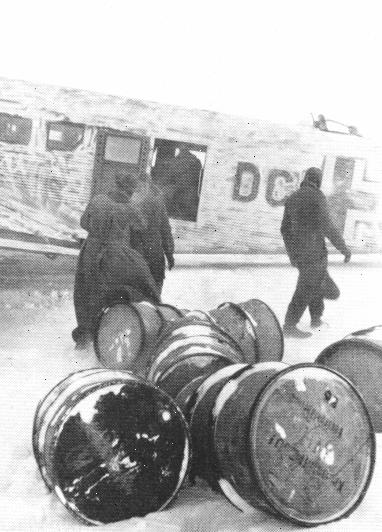
Hitler grew very pale, but did
not say anything. He looked at me with an icy expression and
pushed the bell button on his desk. When an orderly officer of
the SS appeared he ordered,
'Go fetch Field Marshal Keitel and General Jodl.'
Not a word passed between us
until they both appeared. They were here in a minute and
had doubtlessly been waiting in the next room. If that had been
the case, then they must have
heard our loud exchange through the thin walls of the map room.
And they would not have
had any mistaken ideas about the nature of the noise. Keitel and
Jodl saluted formally.
Hitler remained standing with a serious expression on his face.
He was still very pale but
outwardly calm. He said, I am faced with a very difficult
decision. Before I decide, I would
like to hear your opinions. Should I give up Stalingrad or not ?
What are your thoughts
on the matter ?'
And then something began to
unfold that one could almost call a council of war, an
occurrence such as Hitler had never practised before. Keitel,
who was standing at attention,
said with flashing eys, 'My Fuehrer! Stay on the Volga!'
Jodl spoke calmly and factually.
He weighed his words before saying, 'My Fuehrer, it is
indeed a difficult decision you must take. If we withdraw from
the Volga, this means giving
up a good part of the territories we won at such great
sacrifices during the summer offensive.
On the other hand, if we do not withdraw Sixth Army the
situation may become grave.
The operations planned for its relief may be successful, but
they may also fail. Until we
see the results of these operations, my opinion is that we hold
out on the Volga.'
'Now it is your turn,' Hitler
said to me. He was obviously hoping that the words of the other
two generals had caused me to change my mind. Even though it was
Hitler who took the
decisions, he was anxious to obtain the agreement, if only pro
forma, of his professional
advisers. I now came to attention myself and said with all the
formality I could muster.
'My Fuhrer! My opinion has not changed. In my view it would be a
crime to leave Sixth
Army where it is. We can neither relieve it nor supply it. It
would simply be sacrificed and
that would be senseless.'
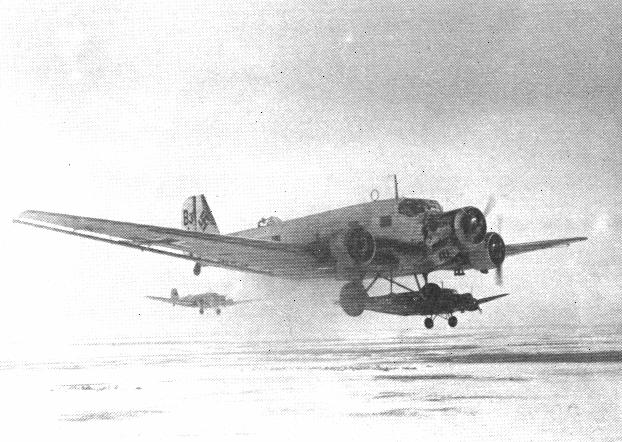
Outwardly Hitler remained calm
and self-controlled even though he was boiling mad inside.
He said to me, 'You see General that I am not alone in my
opinion. It is shared by these two
officers here, both of whom are senior to you. I will therefore
remain with my previous
decision.' He bowed stiffly and we were dismissed.
The second discussion I would
like to describe took place the following night.
Despite Hitler's harsh rejection
of my reasoning, I did not want to give up my struggle for the
salvation of Sixth Army under any circumstances. By experience I
knew that I now had to
approach the problem from a different direction. Hitler's
decision, which appeared to be
final and unalterable, was based on strategic considerations.
There was no sense in trying
to re-open the discussion on these grounds during the next few
days. He would simply
refuse to listen. But this did not apply to questions of supply.
My thought was that where
strategic arguments had failed, maybe matters of supply could
carry the day. Maybe I would
be able to bring him over to my way of thinking if I showed him
the details of Sixth Army's
supply situation and was able to prove to him on the basis of
accurate facts and figures that
an air lift for the army was impossible. Hitler always tended to
be impressed by statistics.
The facts were put together by my
staff in easily readable tables of numbers. As soon as
these were ready, I again asked for a private audience with
Hitler.
He again chose a time late at night. Because of our discussion
of yesterday, the
reception was very cool. However, I succeeded in awakening his
interest in the figures I
showed him and he permitted me to finish the explanations that
were required to understand
the statistics. I closed with the following words. 'After I have
studied the facts in detail there is
only one possible conclusion; it is not possible to supply Sixth
Army by air for a longer
period of time.' Hitler's demeanour became icy. He said, 'The
Reichsmarschall has
assured me that it is possible.' I repeated, that that was not
true. Hitler continued, 'Well
then, let him tell you himself.'
He had the Commander-in-Chief of
the Luftwaffe brought in and asked. Goring,
'Can you supply Sixth Army by air?'
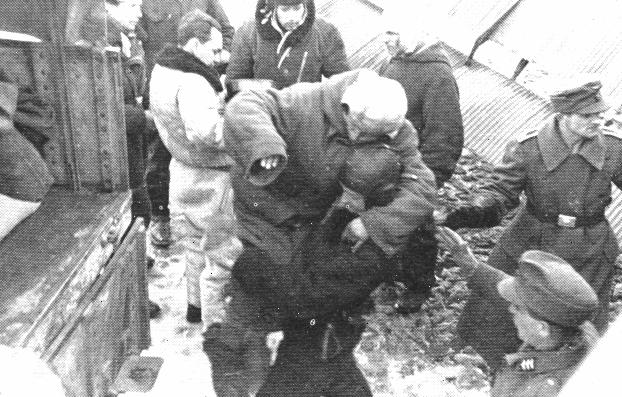
Goring raised his right arm and
solemnly pronounced, 'My .Fuehrer I assure you that the
Luftwaffe can supply Sixth Army.' Hitler threw me a triumphant
look, but I simply said,
'The Luftwaffe can do no such thing.' The Reichsmarschall looked
black and said, 'You are
not in a position to presume an opinion on that.' I turned to
Hitler and asked, 'My Fuhrer,
may I be permitted to ask the Reichsmarschall a question?' 'Yes,
you may.'
'Does the Reichsmarschall know',
I asked, 'the tonnage that must be flown in each day?
' Goring grew visibly embarrassed and wrinkled his brow. He
answered, I do not, but the
officers on my staff will.' On this I continued, if one takes
the actual stock of Sixth Army into
consideration, the absolute minimum requirement, and all sorts
of emergencies, then Sixth
Army will need a daily delivery of 300 tonnes. But since not
every day is good for flying
as I know from my experiences on the front last winter, this
means 500 tonnes each actual
day of flying, if the average minimum is to be maintained.'
Goring answered, I can do that!'
With this, I lost my self-control and cried, 'My Fuhrer, that
is a lie!' An icy silence descended on the three of us. Goring
was white with rage. Hitler
looked from one to the other and was obviously confused and
astonished. Finally he said
to me, 'The Reichsmarschall has made his report and I have no
choice but to believe him.
Therefore I will stay with my original decision.' I now said, I
would like to make one further
request.' Hitler asked, 'And what is that?' I answered, 'May I
give you, my Fuhrer, a
daily report that accurately lists the supply tonnage flown in
to Sixth Army during the
preceding 24 hours?' Goring objected and claimed that this was
none of my business.
But Hitler rejected him and I was given permission to present
this daily report.
With that, the discussion was over.
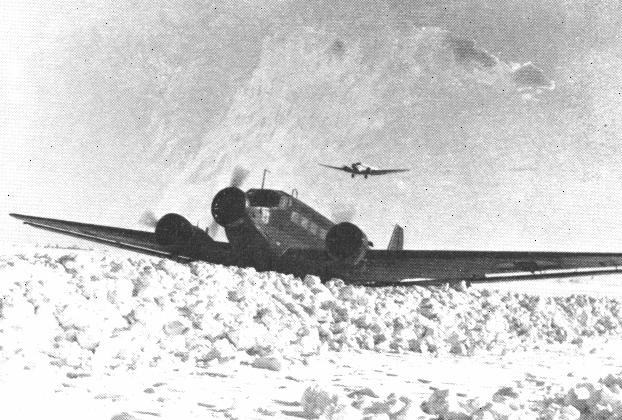
Once again it had been to no
avail. The only thing I had achieved was the enmity of the
Reichsmarschall. I would like to point out here that many staff
officers and commanders
of the Luftwaffe shared my opinion from the beginning. A number
of them put their doubts
down in writing. They were not able to convince their
Commander-in-Chief. He simply
locked their reports away and made sure they did not reach
Hitler's desk...'
Zeitzler's report on the downfall
of Sixth Army ends with the following
sentences: I had struggled for months to make Hitler see reason
and take the
right decisions. I had tailed. I therefore drew some conclusions
as to my own
position as Chief of Staff. I went to Hitler and tendered my
resignation. He was
angry and brusquely said, 'A general does not have the right to
leave his post.'
|